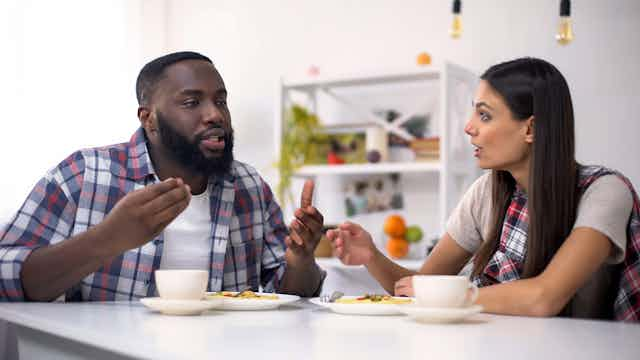Boris Johnson, the UK prime minister, has famously fallen out with his brother Jo over Brexit. The latter quit as a government minister and MP saying he had been torn between “family loyalty and national interest”. But theirs is not the only family facing disagreement on this issue and while most ordinary people don’t have to contemplate resigning from the cabinet as a result, it is certainly a tricky situation to navigate. I’ve been asking British families to talk about how they are experiencing Brexit in their everyday lives and found them using techniques that might be useful to the brothers Johnson. As one of my interviewees put it:
You can love each other to bits and have a different viewpoint, it doesn’t matter … You don’t have to agree, but you don’t have to fall out over it. That’s the thing … that’s the way life is. We’re not all going to agree all the time.
Another said:
We could have had a massive falling out, but I think you think, what’s the point? … At the end of the day, he’s my brother and we get on very well. He’s got a right to do what he thinks is right, hasn’t he?
These participants were talking about family members who voted differently to them in the 2016 referendum on Britain’s membership of the European Union. Like many of the 31 people who took part in interviews for the project, they were experiencing profound differences of opinion that had led to discussions, arguments and feelings of frustration. But these families have not fallen out irrevocably. Rather, families are drawing upon well-established practices of relating and caring for one another and putting in work and effort to cope with their political differences.
Talking politics
Many people in the study have found themselves talking about Brexit a lot:
It’s a constant conversation … these days when you think about it, the majority of things you talk about or people talk about is Brexit.
We found that people had different reasons for talking politics and approached it in different styles. Some wanted to explain to their relatives why they voted the way they did – this feeling was often heightened for people who voted Leave, some of whom felt that the media had misrepresented their position. One participant, Brian, felt he wanted to explain his decision to vote Leave to his Remain-voting son Josh. He described his motivations for wanting to talk to Josh about Brexit, despite the fact that it often resulted in arguments, saying:
I felt a bit defensive and I felt the need to try and explain that … when we voted for Brexit, it wasn’t any kind of kneejerk reaction.
For Brian, and many others, talking politics was a way to ensure that relationships that had previously been characterised by love and respect were not damaged by the referendum.
For others, differences of opinion over Brexit were difficult to overcome through talk. People often adopted strategies of staying quiet to avoid arguments. Sometimes this meant holding back from stating an opinion, as Claudia described in her discussion with a close friend:
He said he was going to vote Labour, and I wanted to say to him that I can’t understand why anybody in their right mind would vote for them, but I didn’t say it, because I didn’t want to cause any sort of controversy.
Many people put a great deal of thought into the ways they approached talking about politics with family and friends. Mona, for, example said that she has bitten her tongue:
Many times, just the other day actually. I was thinking, my dad, I don’t want to seem like I’m bossy or overpowering. Sometimes I think, is that how I come across? Do I get a bit aggressive when I’m debating?
These practices of taking care to talk in respectful ways and to sometimes refrain from speaking about Brexit at all didn’t preclude efforts to educate others about politics. However, it remained important that such exchanges were done respectfully. Participants often said they felt it was important to share only what one interviewee described as “solid facts” – details that they had gleaned from sources they deemed reliable, such as pieces in trusted newspapers, rather than their own opinions or those of others expressed on social media sites like Facebook or Twitter.

Others said they wanted to make sure that people were open to receiving advice before they gave it. Sarah, for example reflected on how, along with her husband, she tried to talk to her brother about his vote:
Sometimes he’d say things like, with Brexit, he was like: ‘I don’t really know what I’m going to do’, so we really worked hard on him with that … Because he didn’t really seem to have looked at anything, so I … sent him some links.
Sarah was clearly keen to emphasise that her brother had voiced his doubts and uncertainty before she “worked on him”, suggesting that she did not wish to imply that she would actively seek to change his mind, rather that she sought to present the option she deemed to be correct given his indecision.
While people in the project dealt with differences in their own ways, the underlying commonality is that a great deal of work, thought and care is expended in the ways people are “doing” family in times of heightened political disagreement and difference. Perhaps some members of parliament would benefit from finding inspiration in the attention people pay to their words in their everyday discussions about Brexit.

